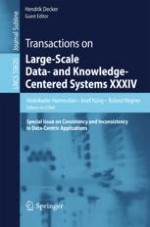This volume, the 34th issue of Transactions on Large-Scale Data- and Knowledge-Centered Systems, constitutes a special issue consisting of seven papers on the subject of Consistency and Inconsistency in Data-Centric Applications. The volume opens with an invited article on basic postulates for inconsistency measures. Three of the remaining six papers are revised, extended versions of papers presented at the First International Workshop on Consistency and Inconsistency, COIN 2016, held in conjunction with DEXA 2016 in Porto, Portugal, in September 2016. The other three papers were selected from submissions to a call for contributions to this edition. Each of the papers highlights a particular subtopic. However, all are concerned with logical inconsistencies that are either to be systematically avoided, or reasoned with consistently, i.e., without running the danger of an explosion of inferences.
